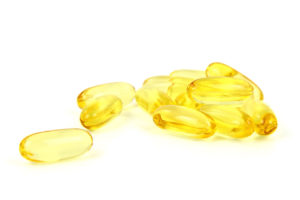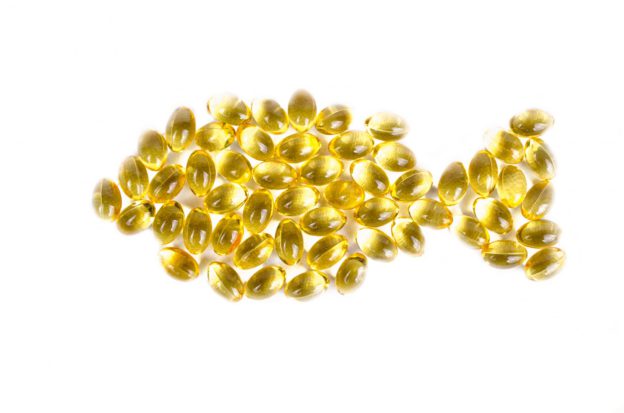I’m sure most of you have heard of the many health benefits of adding fish oil to your diet, for a number of reasons. Well, it can also be great to use fish oil for fibromyalgia in the form of omega-3. Although omega-6 and 9 are also important, most nutrition experts will not argue the importance of omega-3 over the other two, especially the DHA content.
We see omega-3 supplements on the shelves of pharmacies, grocery and health food stores. But what is omega-3 exactly, and how can it be helpful to those living with fibromyalgia? Read on, because these are the questions I’m hoping to answer along with how you can get some more omega-3 into your diet!
What is it?

Grilled salmon, an omega-3 super food.
Unlike other fats we consume, our bodies cannot produce a type of polyunsaturated fat called omega-3 (linolenic acid) and omega-6 (linoleic acid). Because our bodies can’t produce them, these fats, are known as essential fatty acids, and there for must be obtained from our diet. Omega 6 is easier to find from most of the foods we consume already in our typical North American diets. However, we seem to have a much harder time getting enough omega-3.
Omega-3 fatty acids come in three forms: ALA (alpha -linolenic) EPA (eicosapentaenoic) and DHA (docasahexanoic acid). Research shows more reasons for consuming EPA then ALA. There is no doubt however, that the most compelling research shows the many benefits of sufficient DHA intake, even more so then ALA or even EPA.
What can it do for me?
Omega-3 is excellent for your heart. Omega-3 reduces blood clotting, dilates blood vessels, lower triglyceride and cholesterol levels, and helps reduce blood pressure. EPA has been linked with reducing inflammation which can help with rheumatoid arthritis, joint pain (a common fibromyalgia symptom) asthma and even heighten the effectiveness of anti-inflammatory drugs. In fact, the American Heart Association (AHA) recommends that, under the care of a physician, individuals with elevated triglycerides take 2 to 4 grams EPA+DHA supplement.
Omega-3 is great for children and babies. Studies show that DHA may actually help reduce the effects of ADHD in children, improve their mental skills, concentration, and ability to remember and retain more information. This can be especially important for children who are living with fibromyalgia. A developing fetus also requires omega-3 for proper growth and development, particularly concerning the eyes and brain. Pregnant women with FMS should be sure to get enough, especially during the second and third trimesters.

Omega-3 is good for the skin. A bonus! Omega-3 can help those who suffer from psoriasis and other skin conditions! According to well-known dermatologist Dr. Nicholas Perricone, M.D. Omega -3 fatty acids are particularly good at targeting leukotrienes, chemicals that are provoked by the presence of free radicals and are known to promote allergies and skin disorders.
Omega-3 can help relieve pain! Omega-3 fish oil has actually been shown to relive symptoms in inflammatory diseases. Many studies have linked a decrease in joint pain or need for inflammatory drugs in those who suffer from rheumatoid arthritis. It also increases endocannabinoids which are the body’s natural anti-inflammatories, thus could be a reason why many who take it experience less pain. For more information on natural ways to reduce pain click here.
Omega-3 is really good for your brain. Omega-3 can also help fibromyalgia patients who suffer with depression, anxiety and fatigue. Although more research needs to be done, there is also evidence that shows these fatty acids may even help protect against dementia, help improve short term memory loss, reduce the risk of mental illness and improve overall cognitive function, no more ‘fibrofog.’
This is fascinating! According to neurologist Dr. David Perlmutter M.D. not only is DHA helpful for prevention, it can also help reduce and even repair cognitive decline! These are some of the many reasons why nutritionists and dietitians recommend fish oil for fibromyalgia! It is not recommended however, that anyone use omega-3 as the only treatment for any of the disorders mentioned above. Still, there are so many reasons for including it into your diet every day.
Where can I find it?

OK, so we know that omega-3 is super good for our heart, skin, brain, eyes and overall health, but where do we find it? Fish of course! Fish seem to offer the most omega-3, I guess it’s true what they say about fish being brain food! ALA is the type of omega -3 mostly found in plants, nuts and seeds. You can find it in walnuts, vegetable oils and soybeans. You can find EPA and DHA omega-3 naturally in egg yolk, cold water fish and shellfish. The top 10 fish that contain the highest omega-3 content are as follows:
-Salmon
-Mackerel
-Albacore tuna
-Blue fin tuna
-Sable fish
-Sardines
-Herring
-Anchovies
-Shad
-Trout
Salmon is an excellent, and perhaps the best source of these fatty acids. Of all the species of salmon, sockeye is superior. Note that farm raised salmon will contain much less omega-3 than wild salmon, and a lot more fat. Look for the words “wild” or “Alaskan.” Canned salmon is also usually wild. A package that indicates the fish is “Atlantic” usually is just another way of saying farm raised.

Eggs are a good source of omega-3.
What about omega-3 fish oil supplements?
Although nothing compares to the real thing, omega-3 supplements are always good to give you that extra boost. Some people also don’t like the taste of fish, so this would be a good substitute. Of course, as with any supplements, you should consult your physician prior to making any changes in your health regimen.
Omega-3 is available in capsule or liquid form. The major difference between the two is perhaps sugar and other ingredients in the liquid version, to make it more palatable. Liquid omega-3 supplements tend to have a shorter shelf life and may need to be kept in the refrigerator.

Beware, not all supplements are created equally. When purchasing a supplement, whether it’s liquid or capsule, be sure to look for omega-3 from marine sources (unless you are a vegetarian or vegan). You should also check the label for the exact amount of EPA and DHA each capsule contains, to be sure you are getting your money’s worth.
Although there is no established Dietary Reference Intake (DRI), a daily dose of at least 600mg of DHA for adults is recommended by most experts, including well-known cardiologist Dr. Oz M.D. Be sure the supplement is verified by an independent third party for having high purity standards. Look for products that are free from artificial colors, preservatives, sweeteners and GMO’s.
Here is a short list of my favorite omega 3 supplements
- Dr. Tobias omega 3 fish oil
- Viva Naturals omega 3 fish oil
- Sports Research omega 3 fish oil
- Amala Vegan omega 3 (vegan friendly omega 3)
- Nordic Naturals Ultimate omega junior (for kids and teens)
- Nordic Naturals – kids DHA (for toddlers and kids)
- Nordic Naturals baby’s DHA (for infants up to 1 year)
- Nordic Naturals prenatal DHA (during pregnancy and lactation)
We are not getting enough!
There are so many health benefits to taking fish oil for fibromyalgia. Potentially easing the FMS related symptoms of joint pain, depression and memory loss are just the beginning. But there are also many reasons why fish oil is beneficial for everyone and why DHA in particular is so important for our overall health. The problem is most of us simply don’t get enough of this powerful, essential fatty acid. So, why not try to incorporate more omega-3 fish oil into your diet today so you can immediately start reaping the incredible rewards!
